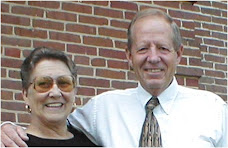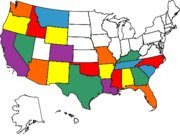Weather: low 73 degrees, high 91 degrees, partly to mostly cloudy skies, showers
There is a tropical depression fooling around in the Gulf of Mexico which has given us some cooler weather for the past couple of days. This morning was really nice, as I felt like the weather was the best for walking that I've seen since we've been here. Here's one of the thunderheads that built up due to the little storm in the gulf.

I had another doctor's visit today with the cardiac care specialist. He told me to keep doing what I'm doing, but didn't give me any relief on the sodium issue. So, I guess we'll keep looking for low sodium foods and menus. After leaving the doctor's office, I came home and gave Carolyn the news. Obviously, she's happy that I'm doing well, but not so happy about the sodium.
After lunch, we had to go to the WalMart Mall for a few groceries. Carolyn was able to go with me, which I was glad to see. It's perplexing that she can take our little road trips where we don't get involved with a lot of people or traffic and not have nearly as many problems with her vertigo. But, if we go to the Mall or any place with a lot of motion and visual stimulation, her vertigo will start showing itself. It happened again today, so we had to limit our time at the mall. Of course, that's not all bad, but it would be nice if she could start doing more.
When we went to Cedar Key yesterday, we passed through the little settlement of Rosewood, where one of the worse instances of racial wrongdoing occurred in our history. I had read about the incident years ago, but never realized exactly where it occurred.
According to Wikipedia..... The Rosewood massacre was a violent, racially motivated conflict that took place during the first week of January 1923 in rural Levy County, Florida, United States. At least six blacks and two whites were killed, and the town of Rosewood was abandoned and destroyed during what was characterized as a race riot. Racial disturbances were common during the early 20th century in the United States, reflecting the nation's rapid social changes. Florida had an especially high number of lynchings in the years before the massacre, including a well-publicized incident in December 1922.
Rosewood was a quiet, primarily black, self-sufficient whistle stop on the Seaboard Air Line Railway. Spurred by unsupported accusations that a white woman in nearby Sumner had been beaten and possibly raped by a black drifter, white men from nearby towns lynched a Rosewood resident. When black citizens defended themselves against further attack, several hundred whites combed the countryside hunting for black people, and burned almost every structure in Rosewood. Survivors hid for several days in nearby swamps and were evacuated by train and car to larger towns. Although state and local authorities were aware of the violence, they made no arrests for the activities in Rosewood. The town was abandoned by black residents during the attacks. None ever returned.
Although the rioting was widely reported around the country, few official records documented the event. Survivors, their descendants, and the perpetrators remained silent about Rosewood for decades. Sixty years after the rioting, the story of Rosewood was revived in major media when several journalists covered it in the early 1980s. Survivors and their descendants organized to sue the state for having failed to protect them. In 1993, the Florida Legislature commissioned a report on the events. As a result of the findings, Florida became the first U.S. state to compensate survivors and their descendants for damages incurred because of racial violence. The massacre was the subject of a 1997 film directed by John Singleton. In 2004, the state designated the site of Rosewood as a Florida Heritage Landmark.
The state has erected a sign outside the little town to commemorate the event. As I was standing and reading the sign, it occurred to me to look around at the surrounding woods and swamp. Can you imagine how terrifying it must have been to be trying to hide in the woods, fearing for your family's lives and knowing that there was no one to turn to for help? Eventually, the survivors were helped by whites that disagreed with the mob mentality.
As people who love our country, we are aware that events occurred during the nation's history that we're not always proud of. I think it's safe to say that this is one of those events.
More later, be safe.
Today's Town - Boston, Massachusetts: Beantown
Not all who wander are lost.




No comments:
Post a Comment